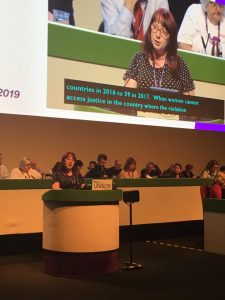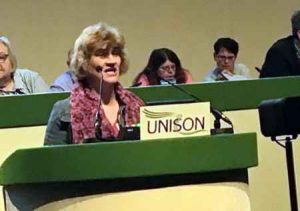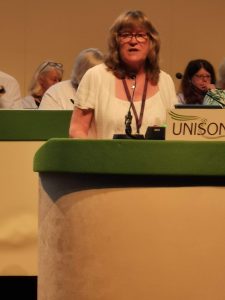
#undc19 This year’s national delegate conference was held against a backdrop of a Tory election campaign, when the new prime minister will be elected by a small group of the population, more than two thirds of whom are white men, and over half of whom are over the age on 56 – hardly a representative group – and of course the prospect of a “no deal” Brexit which would be disastrous for our members and public services.
Deftly chaired by this year’s UNISON President, Ayrshire and Arran Health branch’s Gordon McKay, conference touched on these matters but primarily in relation to how they will impact on our members.The prospect of a hard border in Northern Ireland is a particular worry and conference demanded that the Good Friday Agreement is protected.

The focus of conference and the matters debated were all about the kind of UK we want to see. Delegates slammed racism calling for justice for the Windrush generation and a fair and humane immigration system. Delegates recognised the importance of supporting our young members and a motion from the leadership on how best to resource our branches was overwhelmingly approved.
There was also a strong international agenda with debates on Cuba and Nelson Mandela’s legacy amongst others, and a powerful presentation on Zimbabwe by Barbara Tanyanyiwa of the Zimbabwe TUC Women’s Committee, who spoke of how rights are being rolled back under the new government.
Equality issues remained high on the agenda, with South Lanarkshire’s call to make 2021 the Year of Disabled Workers given overwhelming support. There was also support for LGBT to become LGBT+ to make this group more inclusive and calls to tackle racism in the workplace in communities.

The branch delegation was Branch Secretary Inez Kirk, Pat Lee and Mags Percy from Cornerstone and Morag Lawrence. Kate Ramsden attended in her role as National Executive Council (NEC) member and Kathleen Kennedy represented the National Disabled Members committee.
Our motion on Cornerstone Derecognition was the only one prioritised and unfortunately, despite a re-prioritisation exercise which saw it climb the agenda, it wasn’t reached.
Inez spoke on “Curbing Corporate Power” which committed the union to work with global trade union confederation Public Services International, to monitor the progress and build public awareness and support for a Binding Treaty on Transnational Corporations, a draft of which will be negotiated by the United Nations in October.
Kathleen Kennedy spoke in a number of debates. She called for an end to the gender and disability pay gap
Kathleen also participated in the rules debates twice. She supported the call by young members for an annual conference.
She said that disabled members already have a conference and they very much value the opportunity to come together to discuss issues relevant to them. “Young members should have the same opportunity” said Kathleen.
Kathleen returned to the podium to support a rule change ending the requirement to send out the UNISON rule book to new members in favour of an electronic version unless specifically requested.
She called on the NEC to continue to make reasonable adjustments to make sure the rule book is accessible to all disabled members.
Then Kathleen moved an amendment to a motion on universal credit highlighting the particular injustices faced by disabled claimants.
Kate was at the podium on behalf of the NEC calling for the revival of collective bargaining across the economy, pointing out the strong correlation between high levels of inequality and low levels of collective bargaining, which is an essential lever to developing a fair and socially just society.
Sectoral bargaining pulls the rug out from under privatisation
